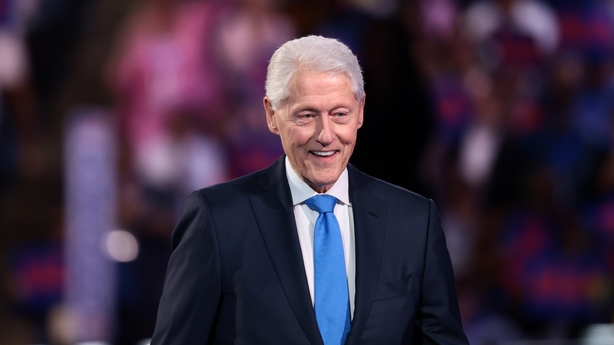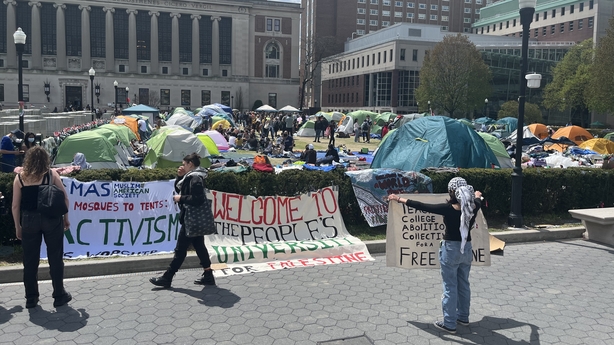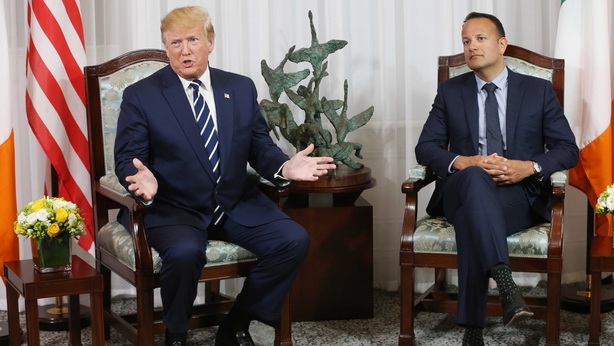Another wild week in American politics - this one with Irish-American bookends.
It started with US President Joe Biden formally passing the torch to a new generation of political leadership at the Democratic National Convention in Chicago, and ended with Robert F Kennedy Junior - son of the assassinated presidential candidate Robert F Kennedy and nephew of the assassinated president John F Kennedy - standing on a stage in Arizona in support of Donald Trump, who survived an assassination attempt last month.
That a scion of Democratic Party aristocracy should support the Republican Party's most controversial candidate of modern times was so unusual that the New York Post gave it the front-page treatment yesterday, under the headline - 'A Kennedy endorses a Republican'.
Highly unusual too was the reaction of his own siblings - a statement from five of them denouncing RFK junior’s support for Mr Trump as a form of family treason.
"We believe in Harris and Walz. Our brother Bobby's decision to endorse Trump today is a betrayal of the values that our father and our family hold most dear. It is a sad ending to a sad story," they wrote.
Mr Kennedy’s presidential bid was important in the 2024 campaign - not in its own rights, as he had no chance of winning, but because of the impact that he would have on the other candidates by drawing away votes from the main candidates.
The closest parallel was to Independent candidate Ross Perot in the 1992 campaign, who won 19% of the vote - ensuring that neither Bill Clinton nor George HW Bush got more than 50% in any state (apart from Mr Clinton in his home state of Arkansas).
Mr Clinton won 370 electoral college votes with 43% of the electorate, Mr Bush 168 electoral college votes on 37% of the popular vote (convicted fraudster Lyndon LaRouche ran from his jail cell that year: 23,000 people voted for him).
Like Mr Perot, there has been dispute over who he would damage or help the most with his campaign.
He was scoring around 10% in polls up until Mr Biden pulled out of the race - then he rapidly halved his share in the polls - as disaffected Democrats of Democrat-leaning Independents rallied to Ms Harris.
Read more:
Trump struggles to keep media spotlight in battle with Harris
Robert F Kennedy Jr withdraws presidential bid in Arizona
But in an election in which the half-dozen or so key battleground states the gap between candidates had closed to within the margin of error in opinion polls, that potential four or five percent of Kennedy voters was worth making an effort for.
Even if only half of them actually come over to Mr Trump in the end, if they are in the right places they could play a big role.
Considering the winning margins in some of the states Mr Biden flipped from Mr Trump in 2020 - 0.8% in Arizona, 0.3% in Georgia (the famous 11,780 votes), 0.7% in Wisconsin, 1.2% in Pennsylvania.
No wonder there have been rumours for months that Mr Trump might offer RFK a cabinet position - such as environment or health secretary - in return for his support.
The afore mentioned Mr Clinton, the third youngest person to be elected US President, retired more than 23 years ago, and came on stage at the Democrat Convention to point out that despite having turned 78, he was still younger than Mr Trump.

Later in his speech, he urged delegates and supporters of candidate Ms Harris to talk to their neighbours, go out and meet them - but not demean them.
He said: "Don’t pretend you don’t disagree with them. But if you do, treat them with respect, just the way you’d like them to treat you". It was mild, elder statesman stuff, unlike the fired-up attack on Trump from the Obama double team the night before.
Just before speeches from the Obamas, Irish-American Democrats held a social event in a restaurant in downtown Chicago (owned by the family of former Irish Senator Billy Lawless).
I dropped in, having sampled a similar event for Irish American Republican’s in Milwaukee.
Despite the fact that Mr Biden was the most Irish president since JFK (Barack Obama quipped later that night that he and Mr Biden shared common Irish blood), there was little sentiment, other than relief, tinged with the euphoria that conventions seem to bring out in delegates.
"We all love Joe Biden, but it became very, very apparent with the polling that he couldn’t win", said Brian O’Dwyer, the New York based co-ordinator of Irish-Americans for Harris.
He told me the change to Ms Harris has boosted enthusiasm among New York Democrats not just for the presidential contest, but also for the contest for control of the House of Representatives.
"We were always going to win New York (in the Presidential contest), but now we think we can flip three, maybe four house seats to the Democrats. It's an entirely new day in New York, as it is over the entire country," he said.
That new found confidence means the New York democrats are relaxed about deploying election workers outside their home state into the nearest battlefield.
He said: "Pennsylvania is the key battleground state in the US. We are going to be concentrating entirely on Pennsylvania. It's close - an hour and a half from New York city, and an hour from the suburbs.
"We can get there, and we are going to be sending waves of people out there, rallies, ringing doorbells and working to get the Democratic party vote out."
Congressman Dan Gildea sits in the House of Representatives for Michigan’s eighth district, rated as the median district for partisanship (217 districts are more Republican, 217 are more Democratic).
Michigan is also a key part of the 'Blue Wall', the three northeastern battlefield states that will effectively decide the outcome of the election.
And its home to America's largest Muslim community, concentrated in the Detroit suburbs, drawn there by the automobile industry in its early days.
Mr Gildea said: "I hope that vice-president Harris will articulate a different perspective on a big issue for Michigan, and that's the issue of Palestine/Gaza.
"She has a nuanced view. It's not quite the same as President Biden’s, and I think if she makes that clear, which I expected her to do, that will make a difference not just for the Arab and Muslim Community in Michigan, but for younger voters who feel very passionate about this issue."
On Thursday night, Ms Harris did make remarks on Gaza, calling for a pathway to self-determination and an end to the war she called devastating.
Watch out for more speeches fleshing out this topic in Michigan - but not straying too far from the Biden line, as appearing solid on foreign policy and defence issues was also a part of her speech.

An interested observer in this part of her address was former taoiseach Leo Varadkar, who spent two nights at the convention.
He said: "I think, certainly listening to Vice President Harris's speech yesterday, it was very strong in terms of international policy and European affairs, you know, a real commitment to continue to support Ukraine, a real commitment to continue an Atlantic partnership and to work together on security, and I also think, on Gaza, showing a level of empathy with the Palestinian people that you don't normally hear from an American politician. And that's, I think that was very reassuring."
I reminded him of the meeting he had with Ms Harris at the Naval Observatory, the vice president's residence where they host a St Patricks Day breakfast meeting for visiting taoisigh.
Mr Varadkar said: "Yeah, I've had chance spent to spend a some time with Vice-President Harris, two pretty long meetings in DC, and I also met second gentlemen Doug Emhoff separately as well.
"And she gave us a lot of time. And I have to say, we really appreciated that. Now I think people are having a chance to see the Kamala Harris that I met - somebody who's bright, who's sharp, who has enormous empathy, who's in politics for all the right reasons."
Do you think she would be Irish friendly in the future if she wins, I asked.
Mr Varadkar replied: "Well, look, we're never going to have a president as Irish as Joe Biden, and it's, I'm really sorry to see him go for that reason, and for other reasons too.
"But I do think she will have an interest in Irish affairs, and it's good to see that the Irish American Caucus here in the Democratic Party - and also in the Republican party too -, remains strong.
"But it's something we're going to have to work on. America is becoming more and more diverse with every decade that passes, and a little bit less Irish.
"So we have to work on this relationship, and it's our responsibility to do that."

Within minutes of Ms Harris finishing her speech, Mr Trump was doing a ring around of conservative leaning cable TV stations, critiquing her policies, notably on corporation tax.
Mr Trump said that allowing his 2017 tax reforms to expire next year will lead to US companies to move overseas "like the pharmaceutical industry did when it moved to Ireland", taking what he insists are US jobs with it.
What did deputy Varadkar make of Trump once again talking about US jobs going to Ireland in 2024?
He replied: "I think economic nationalism is on the rise, not just in America, but around the world.
"So, we have to be prepared for the possibility that the global environment in which Ireland operates isn't going to be as favourable as it was as it was in the past, when it comes to free trade, when it comes to tax, when it comes to tariffs and protectionism.
"That may be the case no matter who's in the White House, and that's something we have to be wise to.
"But I definitely think hearing Democrats speak this weekend and hearing their platform,
"I think they're much more likely to want to work with the urban work on international level, to deal with any grievances that exist around tax or trade, whereas the Trump approach will be more confrontational, and I think that would be causing greater difficulty for a certain shorter term."
What a week in US politics - even Irish and US corporation tax got lost in the wildness.






